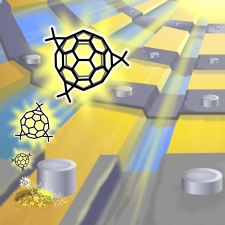Carbon-Based Transistors Ramp Up Speed and Memory for Mobile Devices
Though smartphones and tablets are hailed as the hardware of the future, their present-day incarnations have some flaws. Most notoriously, low RAM memory limits the number of applications that can be run at one time and quickly consumes battery power. Now, a Tel Aviv University researcher has found a creative solution to these well-known problems.
As silicon technology gets smaller, creating a large and powerful memory grows harder, say PhD candidate Elad Mentovich and his supervisor Dr. Shachar Richter of TAU's Department of Chemistry and Center for Nanoscience and Nanotechnology. Working with carbon molecules called C60, Mentovich has successfully built a sophisticated memory transistor that can both transfer and store energy, eliminating the need for a capacitor.

This molecular memory transistor, which can be as small as one nanometer, stores and disseminates information at high speed — and it's ready to be produced at existing high-tech fabrication facilities. Major companies in the memory industry have already expressed interest in the technology, says Mentovich, who was awarded first prize for his work at May's European conference in the session on Novel Materials Approaches for Microelectronics of the Materials Research Society. The basis of the technology has been published in the journal Advanced Materials and Applied Physics Letters.
Closing the technology gap
Mobile devices like smartphones and tablets are the computing devices of the post-personal-computer (PC) era, says Mentovich. These devices, which are small and battery operated, are quickly closing the gap with their laptop or desktop ancestors in terms of computing power and storage capacity — but they are lacking in RAM, the run-time memory reserves that computers need to operate various programs. Because current RAM technology is power-hungry and physically large, it doesn't function well in mobile devices. That's where laptops and PC's retain the edge.
As many as 15 years ago, technology experts realized that the problem with shrinking electronics would be the physical size of the hardware needed to make them run. The idea of a sophisticated transistor, which could do the job of both the transistor and the capacitor, was a technological dream — until now.
In order to tackle this technology gap, Mentovich was inspired by the work of Israel Prize winner Prof. Avraham Nitzan of TAU's Department of Chemistry, who proved that, due to its special structure, a molecule can store both an electric charge and information at the same time. To apply this finding to transistors, Mentovich used C60 molecules, made up of 60 carbon atoms, and put them in the channels of a transistor, creating a smaller-than-silicone, high-speed transistor that could also do the job of a capacitor.
Going mobile
Mentovich believes that this technology is sorely needed in today's mobile world. 2012 was the first year in which big technology companies sold more tablets and smartphones than laptops and notebooks combined, he notes. "When this new technology is integrated into future devices, you will have much more memory on your smartphones and tablets, approaching the level of a laptop. With that kind of memory, you'll be able to run applications simultaneously, and because it is low voltage, power consumption will fall and battery life will be longer."
The next step is to find a fabrication facility with the necessary materials to manufacture the transistors. According to Mentovich, the benefit of this product is that with the right equipment, which is standard in high-tech facilities, and his breakthroughs on how to put the transistors together, these molecular memories could be manufactured anywhere. "The distance to implementation is not far," he says.
Source: Tel Aviv University News Release; July 16, 2012
The originator of a press release or news release is responsible for it's content, not the UnderstandingNano Web site or Hawk's Perch Technical Writing, LLC
--------------------------
---------------------------
